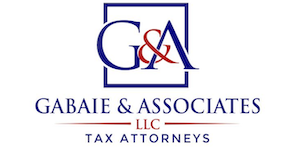Has your bank account been frozen by the IRS? Have you been threatened by the IRS that it will levy your bank account and seize all the money in that account? Even if you have a joint account and the other party is not responsible for the back taxes or liabilities to the IRS, the bank account can still be frozen with the threat the IRS will seize all the funds. This can be extremely stressful and frustrating. Worse yet: time is of the essence. You don't have long to dwell on it, you must immediately contact an IRS bank levy attorney. With an experienced tax lawyer, you have the benefit of a lawyer-client relationship and the benefit of insight and knowledge.
At Gabaie & Associates, LLC, we dedicate our practice to helping clients work out their tax problems in a way that is in our clients' best interests. We know the system and how IRS operates, and we use that knowledge to your advantage. Juda Gabaie, IRS tax attorney, represents clients throughout Maryland and has offices located in Annapolis, Baltimore, Columbia, Frederick, and Rockville.
IRS Bank Levy
An IRS bank levy is a powerful tool the IRS uses to collect on back taxes. An IRS bank levy allows the IRS to hold and then seize -- after a short period of time -- the funds in your bank account or any other financial account. When a levy is placed on your bank account, there are only 21 days to acquire a release of the levy before the IRS takes your money -- and it will take all of it so long as it is within the amount you owe the IRS.
If your bank account has been levied, you are likely feeling the stress and have serious questions. Read through the information here and contact Gabaie & Associates, LLC today for a consultation. Don't delay, because you only have three weeks to obtain a release of the levy before your account is wiped empty.
How is an IRS Bank Levy Started?
The IRS must follow proper protocol before it can levy your financial account. The IRS cannot just take your money without warning. It will assess your tax liability and first send a Notice and a Demand for Payment. In that communication, you will be advised of how much is owed and how long you have to pay it. You generally have ten days to respond to the Notice and Demand.
If you ignore the first notice and make no attempt to satisfy the payment demand within the required time limit, the IRS will send a Final Notice of Intent to Levy and a Notice of Your Right to a Hearing. Thirty days after the Final Notice has been sent, the IRS will serve a levy on your bank account or other financial account. Once your financial institution receives a notice of seizure of your funds, the bank must comply with the notice by holding the money for at least 21 days and then -- if no action is taken on your part to prevent it and to obtain a release of the levy -- the bank will transfer the funds to the IRS.
How Much Money in Your Bank Account Can Be Taken?
When the IRS places a levy on your financial account, it has the power to seize all the money in your account. The IRS is not bound by any kind of cap on how much money it can seize from a bank account if the money within the account is within what you owe.
What are Your Options to Remove an IRS Bank Levy?
You have options with regard to a release of the levy on your financial accounts. First, if the levy poses a proven financial hardship, the levy will be released. Second, the IRS may be required to release the levy under certain circumstances, which typically include:
- You pay the liabilities you owe, including taxes, penalties, and interest.
- You declare bankruptcy.
- A showing that if the IRS releases your funds, that release will help you pay your tax liabilities.
- You enter into an Installment Plan Agreement and as part of the terms of that agreement, a release of the levy is required.
- The property's value is more than what was owed and releasing the levy will not prevent the IRS from collecting on the liabilities.
There are other situations when a levy may be released, and it usually falls on the behavior of the IRS, to which an experienced attorney like Juda Gabaie will identify and appropriately respond. These include:
- The IRS generally did not follow its own procedures.
- The IRS levied the financial account before the proper Notices were sent.
- The IRS enters an Installment Agreement that requires the levy to be released, but the IRS does not release the levy.
An experienced tax attorney can help you develop a strong case, but if in the end your request for a levy release is denied, you can appeal the decision.
Also, remember that although the IRS is not bound by many federal and state laws when it comes to levying financial accounts, it is bound by a statute of limitation. The IRS has only ten years to collect back taxes (there are many exceptions which can prolong the statute of limitation) and other liabilities (e.g., fees or fines). It may be that after ten years, the IRS is prohibited by law from seeking collection of funds from you.
Dedicated IRS Bank Levy Attorney in MD
If you have or are threatened with an IRS bank levy, get professional help from an experienced tax attorney. Contact Gabaie & Associates, LLC today at 443.345.8291 for a consultation.
